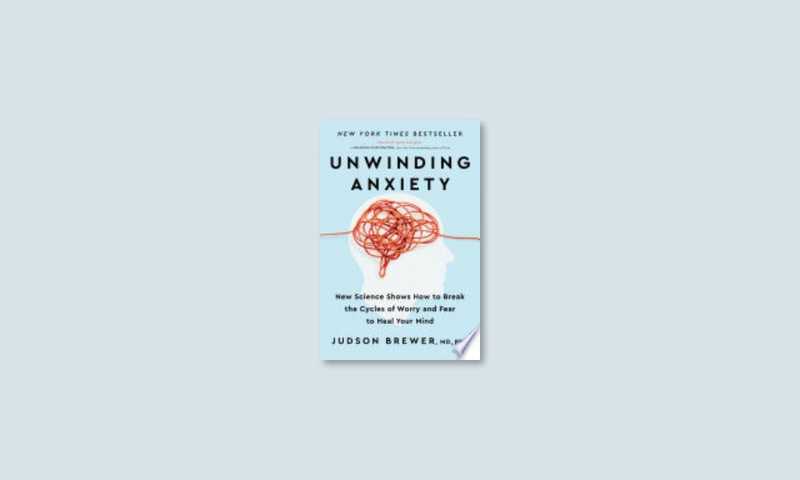
Unwinding Anxiety by Judson Brewer: Actionable Tips to Reduce Stress and Anxiety
In "Unwinding Anxiety," psychiatrist and neuroscientist Dr. Judson Brewer offers a groundbreaking, evidence-based approach to understanding and reducing anxiety. Drawing on his extensive experience in the field, Brewer combines scientific research, real-life examples, and practical advice to provide a comprehensive guide for anyone looking to overcome anxiety and lead a more fulfilling life.
In this blog post, we will explore some of the actionable insights from "Unwinding Anxiety" to help you better understand the nature of anxiety and implement effective strategies to reduce stress in your life. By the end of this post, you'll have a better understanding of how anxiety works, and you'll be equipped with some powerful tools to help you navigate the challenges and uncertainties of everyday life.
Actionable Insights to Reduce Stress and Anxiety
To effectively reduce stress and anxiety, it's essential to understand the root causes and triggers of these emotions. Dr. Brewer identifies three primary components that contribute to anxiety: habits, rewards, and curiosity. By addressing each of these components, you can begin to unravel the cycle of anxiety and reclaim control over your mental well-being.
1. Recognize Anxiety-Driven Habits
Anxiety can often be perpetuated by our daily habits. To break free from this cycle, it's important to identify and understand these habits. Dr. Brewer suggests the following steps:
- Become aware of your anxiety triggers: Identify situations, thoughts, or feelings that cause you to feel anxious. Examples may include work deadlines, social situations, or specific worries about the future.
- Recognize the habitual response: Determine how you typically respond to these anxiety triggers. Common responses include avoidance, procrastination, or seeking reassurance from others.
- Acknowledge the short-term relief: Understand that these habitual responses may provide temporary relief from anxiety, but they also perpetuate the cycle by reinforcing the habit loop.
2. Understand the Reward System
To break the cycle of anxiety, it's crucial to understand how our brains are wired to seek rewards. Dr. Brewer explains that our brains are designed to prioritize short-term rewards, even if they come at the expense of long-term well-being. This reward-seeking behavior can lead to anxiety-driven habits, which can be difficult to break.
To rewire your brain's reward system, try the following strategies:
- Identify the true rewards: Recognize that the short-term relief provided by anxiety-driven habits is not a genuine reward. Instead, focus on the long-term benefits of breaking free from anxiety, such as improved mental health, increased productivity, and deeper relationships with others.
- Reframe the rewards: Shift your perspective and consider how breaking the cycle of anxiety can lead to more significant rewards in your life. For example, instead of viewing a difficult conversation as a source of anxiety, view it as an opportunity to strengthen a relationship or resolve a lingering issue.
- Practice mindfulness: Engage in mindfulness practices, such as meditation, to increase your awareness of your thoughts, feelings, and actions. This heightened awareness can help you recognize when you're engaging in anxiety-driven habits and make more conscious decisions about how to respond.
3. Cultivate Curiosity
Curiosity is a powerful tool for combating anxiety, as it allows us to approach our fears and concerns with an open, non-judgmental mindset. Dr. Brewer recommends the following techniques to cultivate curiosity and reduce anxiety:
- Ask open-ended questions: Instead of getting caught up in worry or fear, ask yourself open-ended questions about your anxiety triggers. For example, "What is the worst that could happen if I give this presentation?" or "What would it feel like to face this fear head-on?"
- Adopt a beginner's mind: Approach anxiety-provoking situations with a sense of curiosity and wonder, as if you're encountering them for the first time. This can help you see the situation from a fresh perspective and diffuse anxious thoughts.
- Practice self-compassion: Treat yourself with kindness and understanding, recognizing that anxiety is a natural human emotion. By adopting a self-compassionate attitude, you can create a safe space for exploring your anxiety without judgment or criticism.
4. Develop a Personalized Plan
To effectively reduce anxiety, it's essential to create a personalized plan that addresses your unique triggers and habits. Dr. Brewer suggests the following steps to develop a tailored approach:
- Set specific goals: Determine what aspects of your anxiety you want to address, such as reducing worry or improving your ability to cope with stress.
- Identify your resources: Consider the tools and support systems you have at your disposal, such as therapy, mindfulness practices, or supportive friends and family members.
- Create a step-by-step plan: Break down your goals into manageable, achievable steps. For example, if your goal is to reduce worry, you might start by practicing mindfulness for 10 minutes each day or scheduling weekly check-ins with a therapist.
5. Monitor Your Progress
To ensure that your anxiety-reduction plan is effective, it's important to track your progress and make adjustments as needed. Dr. Brewer recommends the following techniques for monitoring your progress:
- Keep a journal: Record your thoughts, feelings, and experiences related to anxiety. This can help you identify patterns and track your progress over time.
- Set regular check-ins: Schedule periodic self-evaluations to assess your progress and make any necessary adjustments to your plan.
- Celebrate your successes: Acknowledge and celebrate the progress you've made in reducing anxiety, even if it's small. This can help reinforce positive habits and motivate you to continue working toward your goals.
Conclusion
Reducing stress and anxiety is an ongoing process that requires self-awareness, understanding, and effort. By implementing the actionable insights shared in "Unwinding Anxiety" by Dr. Judson Brewer, you can begin to break the cycle of anxiety and cultivate a more resilient and adaptive mindset. Remember to recognize your anxiety-driven habits, understand the reward system, cultivate curiosity, develop a personalized plan, and monitor your progress. With practice and persistence, you can create lasting changes in your mental well-being and improve your overall quality of life.